Expert Buyer's Guide to Fine Jewellery From Diamonds, Emeralds, Silver and Gold to Museum Shows and record-breaking auction results. Value My Stuff has something for everyone in this year’s Buyer’s Guide!
written by Patrick Morgan
Let’s take a look at the number one question we hear from clients at Value My Stuff
“How much is my jewellery worth?”
There are a multitude of factors involved in this simple question, and knowing that “HW” does not stand for Hans Wilsdorf (the founder of Rolex), but rather is the makers mark for Harry Winston (1896-1978), one of the most respected names in the jewellery business since the opening of his NYC storefront back in 1932, is one of the many ways we can determine the value of your precious jewellery.
Emerald and diamond necklace. Image: Public Domain
How to find the value of jewellery?
The many letters, numbers and artistic symbols that can be found on a piece of jewellery. That can make defining the piece rather confusing, to say the least.
Each stamp or marking on a piece of jewellery tells a story, which can explain the material purity, designer, brand, artist, and sometimes even the country of origin and the epoch when it was made. So let’s take a closer look at some of the more important ones to understand
Related: How to Value Fine Jewellery?
The maker’s marks and stamps on your Jewellery
The maker’s mark is a signature imprint, a goldsmith or silversmith strikes into a finished piece. It identifies the brand and or the artist. Some, like Cartier's famous signature stamp, are easier to identify than others, especially when time has partially worn away the letters or symbols originally on a piece.
There are several online databases for maker’s marks and various jewellery symbols, but scrolling through thousands of images to find your “needle in a haystack”, may take some time.
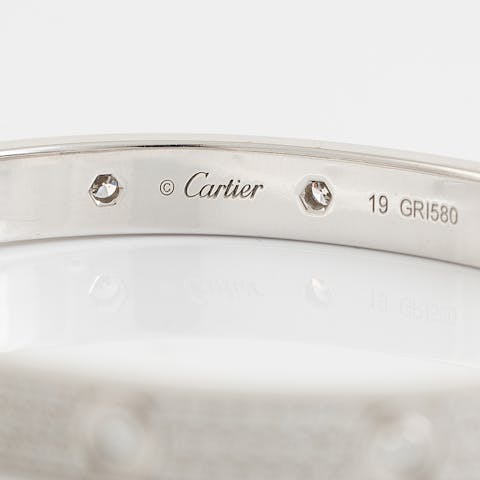
Cartier mark on a white gold and diamond bracelet. Image / Bonhams
Jewellers, or purity markings
Jeweller’s or purity markings are the stamps struck in the finished piece which indicate the level of purity for Platinum, Gold and Silver, which is contained in any type of jewellery. Read further for a clearer understanding.
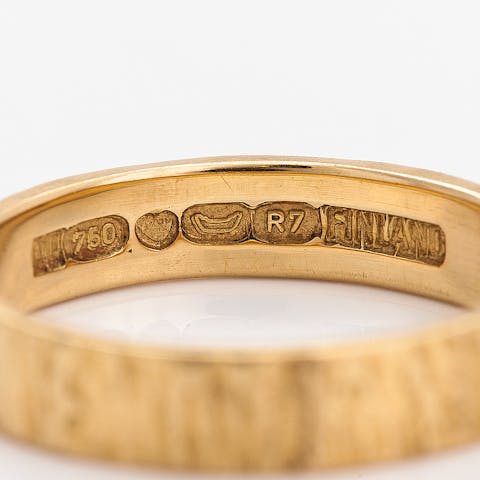
Purity markings and other stamps on a gold ring. Image/ Bonhams
Platinum stamps
Platinum has four degrees of purity; .999, .950, .900, and .850, with each number being the precise percentage of metal content.
Gold stamps
Gold purity has six common degrees; .995 (14k), .955 (23k), .915 (22k), .750 (18k), .585 (14k), and .375 (9k).
Silver Stamps
Silver purity has four degrees; .999, .958, .925, .800.
"The numerous letters, numbers and artistic symbols that can be found on a piece of jewellery, can make defining the piece rather confusing, to say the least."
In addition to purity markings it is also important to understand what stamps denote faux jewellery; GP; Gold Plate, GF; Gold Fill, RPG; Rolled Gold Plate and GE or HGEm which can be found on electroplated gold jewellery. Suffice it to say, these last few stamps should be avoided when considering a serious purchase.
Gold is selling for over £1800 GBP an ounce, that’s about £60 GBP a gram. Gold has historically been one of the most stable long-term investments, and it is this intrinsic value which makes gold such a timeless asset.
Related: Cartier, a jewellery to love
How to test your jewellery at home?
There are also a few simple tests one can do at home to check the quality of some types of jewellery you may already own.
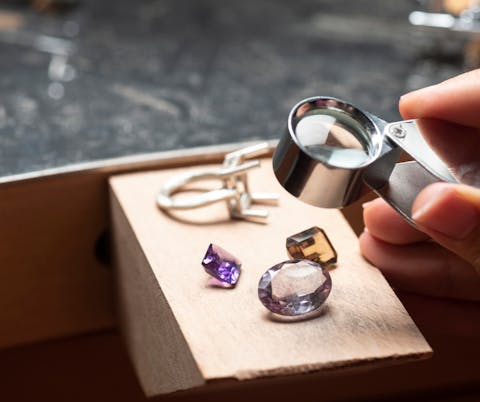
Testing precious stones and precious metals. Image: Public Domain
The Magnet Test
Platinum, Gold and Silver are NOT magnetic, so if the magnet sticks, it’s some type of costume jewellery.
The Vinegar Gold Test
Put a few drops of white vinegar on a piece of real gold, and it will not change colour, however if the metal does change colour, then what you have is not gold.
The Diamond Breath Test
A genuine diamond retains no heat, therefore if the stone fogs up when breathed upon, it’s either glass, crystal or zirconium.
How to professionally appraise your jewellery?
As the song goes “Diamonds are a girl’s best friend”, but when it comes to valuing them, especially if they are loose stones, the process becomes very complex and requires the advice of a GIA certified gemologist who can grade the stones according to cut, clarity, size and colour.
"Platinum, Gold and Silver are NOT magnetic, so if the magnet sticks, it’s some type of costume jewellery."
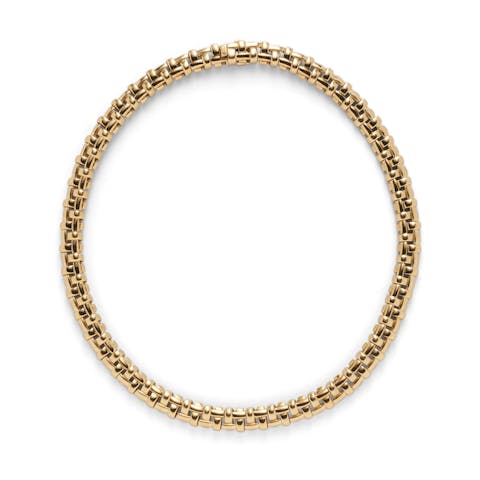
Tiffany & Co., a 18K Gold Necklace, Italy. Image: Bonhams
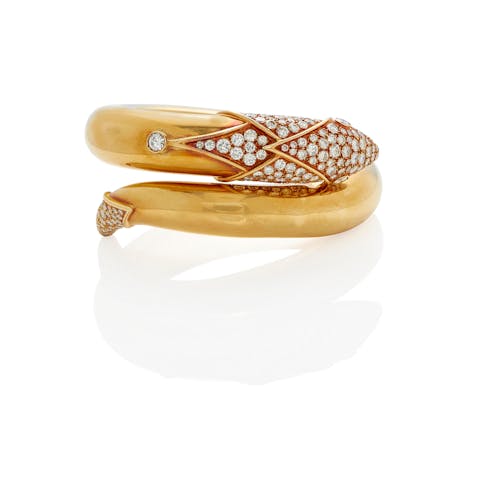
Christian Dior, 18K Gold and Dimanods Snake Hinged Bangle, sold in Bonhams Los Angeles in 2021 for £24,062.50. Image: Bonhams
In addition to grading gems, it’s important to understand the price range a simple, round-cut, one carat, white diamond can have; (between £1500-20,000 GBP), depending on the four variables of cut, clarity, colour and carat, as well as the differences between the three valuation types of appraisals which apply to all gems and jewellery.
Insurance Replacement Value
Insurance Replacement Value is the highest appraisal figure, based on the original full retail price and it does not take into consideration standard wear and tear of the piece but rather what it will cost to buy a brand new item.
Fair Market Value
Fair Market Value is what one might expect to receive as an auction estimate for jewellery consignments or what a piece might sell for in the second-hand marketplace, factoring in age, wear and tear, overall condition, etc.
Immediate Liquidation Value.
Immediate Liquidation Value, is the price one should expect to receive from a pawnbroker or wholesale jeweller when offering it for sale. This is usually about one third of the replacement value, meaning that if a ring had an insurance replacement value of £1000 GBP, then it would be reasonable to expect an immediate sale price of between £250-350 GBP, depending on the quality of the piece.
It is always good to appraise your jewellery first hand, but if you already have a certificate and want to check your current value, you can use Value My Stuff’s online appraisal service. Our experienced GIA certified experts will help you establish the value of your fine jewellery based on the photos and documentation you can provide. Remember to always attach the images of any markings, numbers and stumps of your jewellery as well as close up images of the stones set in your pieces to get the best result.
Start your fine jewellery valuation here!
What fine jewellery to buy in 2023?
Some of this year’s brightest fashion trends will see lots of big bangles and big earrings. Vintage pieces from Cartier, Dior and Chanel will be making big comebacks. And 2023’s number one gem will be the emerald.
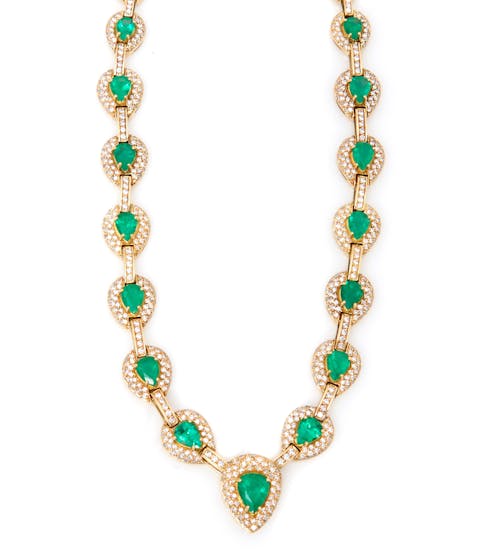
A diamond and emerald necklace, sold In Bonhams Los Angeles for £11,875. Image: Bonhams
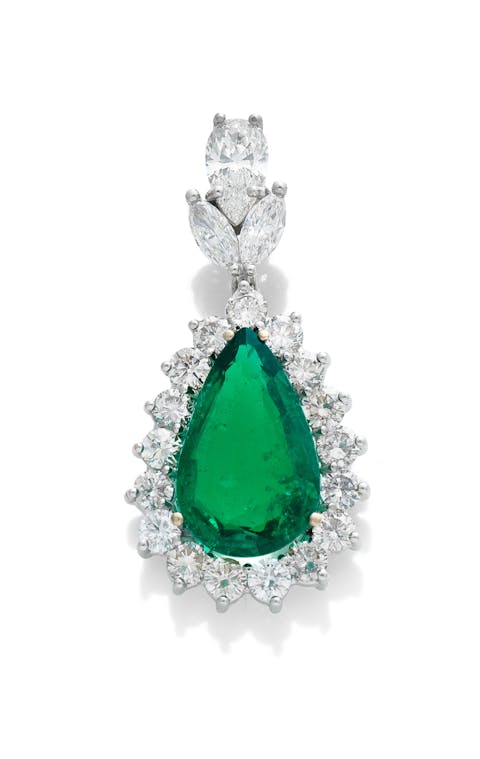
A emerald pendant pear-shape, weight 8.83cts, Colombia minor clarity enhancement, estimated value in 2020: £25,000 - £35,000. Image: Bonhams
Of the four gems, emeralds have the greatest range in valuation per carat; between £1-100,000 GBP, it’s all about colour, cut, size, clarity and inclusions. The best emeralds always come from Columbia, just make sure they are natural, certified, untreated stones.
Green colour tones and emerald stones will be one of the biggest trends of the season, so expect to see lots of emerald bejewelled models on the runways and in all the fashion magazines.
For upcoming jewellery auctions always check Barnebys website to be up to date!
"The best emeralds always come from Columbia, just make sure they are natural, certified, untreated stones."
Museum shows for fine jewellery enthusiasts
If you happen to be in either Paris or Los Angeles this spring, there are two blockbuster museum shows that should not be missed. In Paris, there’s “Ramses the Great and the Gold of the Pharaohs”, through September 6, 2023 at La Grand Halle de la Villette in Los Angeles, at the Getty Villa in Malibu, it’s “Nubia, Jewels of Ancient Sudan From the Museum of Fine Arts, Boston”, until April 3, 2023. Both of these shows trace the history of semi-precious gems and gold jewellery almost four thousand years back and touch upon the importance that personal adornments had on these early cultures, who were without question, some of the most sophisticated peoples of their time. These two cultures who both lived along the shores of the Nile between Egypt and Sudan, were true lovers of gold. The exhibitions will include examples of gold jewellery made for young children, men and women. Gold rings, gold bracelets and gold necklaces as well as more important pieces made for religious and protective purposes. Scarabs in turquoise, necklaces with complex inlays of carnelian, lapis lazuli and, if you are in Paris, you can see what is widely considered the most important work of art from ancient Egypt: The Burial Mask of King Tutankhamen, which is perhaps the most sophisticated work of jewellery from ancient times, cast in solid gold and adorned with inlays of lapis lazuli, quartz, obsidian, carnelian and turquoise.
So whether it’s a museum show, an auction search, or a quick valuation, look no further than Value My Stuff and Barnebys for all your Jewellery needs!
The most expensive Jewels ever sold at auction
Is there a more significant status symbol than a massive piece of jewel? Perhaps not! Here are the five most expensive jewels ever sold at auction.
1. "The Pink Star", sold by Sotehby's in 2017 for £71.2 million.
2. "The Oppenheimer Blue", sold by Christie's in 2016 for £57.5 million.
3. "Memory of Autumn Leaves & Dream of Autumn Leaves", sold by Sotehby's in 2017 for £57.4 million.
4. "The Winston Pink Legacy", sold by Christie's in 2018 for £50.7 million.
5. "The Blue Moon of Josephine", sold by Sotehby's in 2015 for £48.4 million.
Marie Antoinette’s Pearl
In November 2018, Sotheby's made headlines by selling Marie Antoinette's beautiful large natural pearl and diamond pendant. The selling price landed at a whopping £36.2 million! With the Marie Antoinette provenance, the pearl wouldn't get such a high hammer price, but who can blame the bidders?
Patrick Morgan is a general certified antique appraiser with over 25 years of experience, working with Caldwell and Associates, based in San Diego, CA, since 1998. Based in Paris, since 2002, he visits the auction rooms and combs the flea markets for treasures whenever he has some spare time, collecting anything from watches to weapons, while continuing his primary focus on Tribal Arts.

